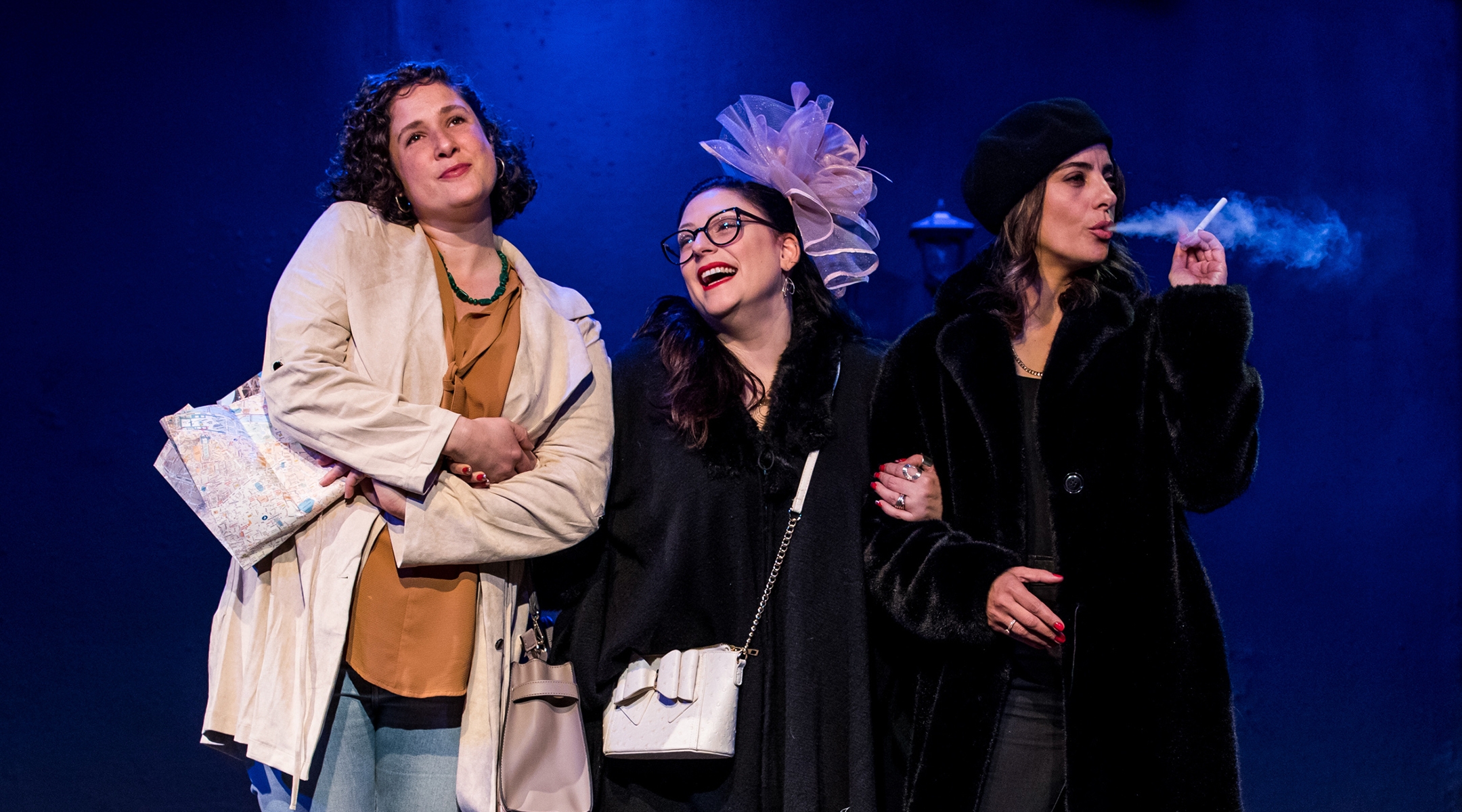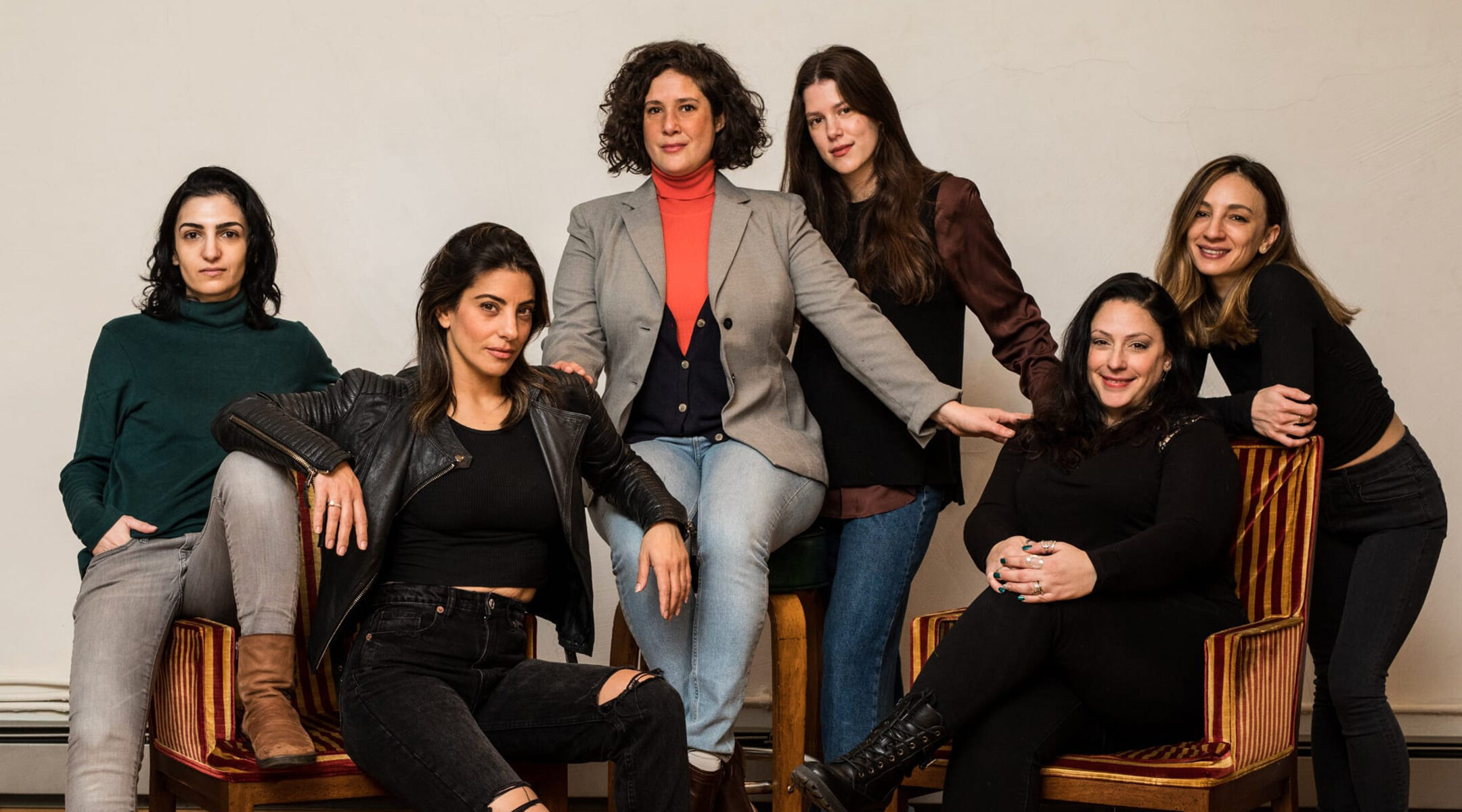(New York Jewish Week) — When Anat Gov’s play “HaChaverot Hachi Tovot” (“Best Friends”) premiered in 1999, it was an anomaly among Israeli works of theater. In fact, Gov wrote it with anomalous intentions: In an interview before it opened, she called the piece a form of “compensation for the fact that there are no good roles for women.”
To remedy this, Gov wrote a play with no male roles — a 100-minute romp down memory lane which calls into question the very nature of friendship and whether or not the love between BFFs can stand the test of time.
At the time, the play was a smash, winning the Israel National Theater Award for best comedy of the year, and playing over 700 times during its initial run at the acclaimed Cameri Theatre in Tel Aviv. “Best Friends” was then rewritten as a TV miniseries for HOT, a popular Israeli TV network, and re-staged in 2013, after Gov’s death the previous year.
Today, the play is enjoying a new imagining here in New York: Through April 2, it’s being performed at the Rattlestick Theater in Manhattan, in alternating performances in both Hebrew and English, by the team at the Israeli Artists Project, a non-profit that presents Israeli theater, music and art in the greater New York area.
“Best Friends” is ostensibly about friendship but touches on broad themes of jealousy, fertility struggles, betrayal and much more. And yet, intentionally or not, its deep dive into the force and fury of the female experience comes at a time when the cause of women’s rights is seeing setbacks in Israel and the United States.
“There are so many facets to our work,” says Yoni Vendriger, founder and producing artistic director of IAP. “But to put it simply, we want to be a home where people of any affiliation can come together, enjoy our common culture, and put politics aside. In a way, everything we do is inherently political. We are, after all, representing a country. That said, we’re interested in doing Israeli things, being Israeli people, without automatically politicizing our events.”
The play, which is both hilarious and heartbreaking, centers on three women — Leli, Sophie and Tirtza — who are at a breaking point in their lifelong friendship. In the opening scene, Leli calls her two ex-besties to gather; it’s a matter of life or death, she says, refusing to say which one it is. Despite an extended period of silence between the three and heightened tensions between Sophie and Tirtza, in particular, they come together, and begin to unpack every single piece of emotional baggage they have.
As is the case in actual lifelong friendships, there’s a lot to unpack here: high school crushes, first loves, heartbreak, professional successes and woes, births, marriages — no stone is left unturned. Shouting ensues, and laughter, and some awkward silences.
“We need more plays that give central roles to women,” said Vendriger. “It’s not necessarily about writing plays without any male roles, either. What’s critical is writing more lead roles for women, more well-rounded, rich roles for women.”
“Best Friends” is an extreme version of this, of course, by omitting all men from the cast, and it easily passes the Bechdel Test — that is to say, it includes at least two named female characters who discuss something other than a man — with flying colors. Leli, Sophie and Tirtza certainly talk about men, love and heartbreak, but the primary focus is on how they’ve let themselves, and each other, down.
One of the most effective choices Gov made was to have the drama play out in two decades simultaneously. There are two casts: a young version of the women, in the 1960s, and a middle-aged version, in the 1990s. Beyond the illustrative power of showing friendship instead of telling about it, Gov creates a fascinating dynamic between the two sets of women. At times, the two casts interact, holding one another, reminding one another of their various strengths and shortcomings. Who among us hasn’t wished to warn or encourage our younger selves, or that our younger selves could remind us of who we once were?
This revisited version of Gov’s classic was slated to run in New York in May 2020 — but the pandemic, of course, made that impossible. Instead, it arrives in time for Women’s History Month 2023. “The timing kind of just worked out for us,” explained Vendriger.

From left, Maia Karo, Adi Kozlovsky and Karin Hershkovitz Kochavi play a trio of BFFs in “Best Friends.” (Ohad Kab)
In Israel, a right-wing government is under siege by rivers of enraged citizens — primarily because of Prime Minister Benjamin Netanyahu’s proposed judicial overhaul, now on pause. But there is pushback among liberal Israelis for other reasons as well. Recently, Betzalel Smotrich, a far-right member of Knesset and the current minister of finance, made sure that Israel would not sign the UN’s International Violence Against Women Act. Prior to this, Smotrich had called himself a “proud homophobe;” he organized a “bestiality parade” as a counter-parade to the Jerusalem Pride march in 2006.
In the United States, women’s rights are also threatened — including by the dismantling of Roe v. Wade, ensuring their right to an abortion.
Against this backdrop, the 1990s of “Best Friends” look downright progressive. To Vendriger, however, this play is about the timeless nature of friendship.
“Gov managed to write in a way that makes her work continuously relevant, regardless of the passage of time,” he said. “It’s the humanity of it. There are connections, power struggles, interpersonal attractions — that stuff will never change. Despite the fact that it’s originally from the ’90s, the meditation on the power and fragility of friendship, on the fact that we need to maintain and work on friendships, it all feels immediate and very appropriate for the present day.”
In fact, the IAP team made no changes to the original text.
The play works today, in 2023, because it leans on universal, wide-reaching themes. At the same time, there is a palpable Israeliness to the whole thing, whether it’s the prickly slang or the fact that one character, whose son is serving in the first Lebanon War, is jealous that her friend’s son has asthma, and therefore gets to stay home.
“‘Best Friends’ integrates the complexity of humanity, friendship and Israeli society, and brings them into the realm of humor,” said director Hamutal Posklinsky-Shehory. “It’s funny, but it’s also dramatic and very witty. [In this iteration] the whole staff is female. All the actresses are — six onstage and two understudies — plus the assistant director, play manager, lighting designer, and costume designer. I feel this is very appropriate for the age that we’re living in and really underlines the space we need to give for female identifying artists.”
When Posklinsky-Shehory isn’t directing, she’s a drama therapist at NYC Peace of Mind, a group psychotherapy practice that brings together drama therapists to support and enrich one another’s creative treatment approaches. Her work, she said, informed her directorial choices. “The relationships presented between the three friends are not the healthiest ones,” she said, “and we went through a process, truly trying to figure out and understand the motivations and [emotional landscapes] of the characters.”
To this end, the cast used therapeutic techniques alongside theatrical practices in order to deepen their connections and understanding. “We incorporated some writing activities, with the actors writing to their characters. Another time, we sought connections and differences between our actors and the characters that they play, as a group. In this way, we developed trust and deepened our bond with one another,” she said.
This is, in a sense, the bottom line of the play: the bonds that tie, and how they can unravel under the strains of a lifetime. “As humans, we’re complex,” said Posklinsky-Shehory. “Even in a play that’s all fantastic and sweet and nostalgic, there’s still the complexity and darkness [of life]. I’d like people to leave with an understanding that what we feel is perfect and complex, and that’s OK. We need to accept those parts of ourselves and our society.”
The New York Jewish Week brings you the stories behind the headlines, keeping you connected to Jewish life in New York. Help sustain the reporting you trust by donating today.





